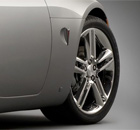Mercedes sets sights on SUV segment
Updated: 2012-04-23 07:58
By Zhuan Ti (China Daily)
|
|||||||||||
|
Asian debuted ML 63 AMG will be launche at the Beijing Auto Show. |
There is a reason why Mercedes engineers are so skilled in the development of groundbreaking all-wheel drive concepts.
The history of all-wheel drive at Mercedes-Benz dates back to 1904, when the first all-wheel drive vehicle was designed at Daimler-Motoren-Gesellschaft.
It was quickly followed by further designs that had heavy support from the military.
In 1907, DMG introduced the Dernburg Wagen. Weighing 3.6 tons with a climbing ability of 25 percent, it was the first all-wheel drive passenger car for everyday use developed based on a truck chassis.
With the military showing little interest, Mercedes-Benz debuted the lightweight G5 all-wheel drive passenger car at the London Motor Show in 1938, billing it as a "colonial and hunting vehicle".
1973 marked the start of a new era in all-wheel drive development after a cooperation agreement was signed between Daimler-Benz AG and Steyr-Daimler-Puch.
Production of the G model subsequently began in late 1978. With a climbing ability of up to 80 percent, the G mode, could handle the toughest off-road terrain with ease while at the same time providing safe and comfortable handling on the road.
In 1989, the G model series - renamed the G-Class in 1993- became a Mercedes-Benz passenger car division. More than 30 years after the first model rolled off the line, the G-Class is still being built, though different body designs and engines are used.
The mid-1980s also saw the debut of the revolutionary all-wheel drive 4MATIC system in the mid-range Mercedes, which was what the Mercedes-Benz E-Class was called at the time.
In 1997, a second generation of all-wheel drive vehicles was presented in the E-Class model series 210.
Designed as a full-time all-wheel drive, the new 4MATIC was combined with the electronic traction system, or ETS, which replaced the standard differential locks in conventional all-wheel vehicles.
1997 was also the year that Mercedes-Benz established the M-Class market segment, equipped with 4MATIC and the 4ETS four-wheel traction control system.
Mercedes-Benz in 2005 presented the entirely new R-Class model series with 4MATIC. This was followed in 2006 by the GL-Class, Mercedes-Benz's first full-size SUV. In 2008, the GLK-Class celebrated its world premiere as the first compact SUV with 4MATIC.
Today, Mercedes-Benz offers the sophisticated 4MATIC all-wheel drive across 10 of its model series globally. In China, the successful technology is featured extensively in the company's top-of-the-line S-Class series as well as its premium SUV model range.
zhuanti@chinadaily.com.cn
Related Stories
First China-made Beijing Benz SUV on show 2012-04-23 10:32
China a cornerstone in sustainable growth for Mercedes-Benz 2012-04-23 07:58
Models at Beijing Imported Auto Expo 2012-04-18 17:52
Mercedes new SL at Geneva Auto Show 2012-04-18 14:31
- Students see profit in business studies overseas
- Market to have more say in yuan value: PBOC's Yi
- Group-buying sites hit by consolidation
- China's Dongfeng plans aggressive auto export
- Wen's visit to Germany highlights strategic ties
- Listed firms see narrowing profits
- Getting the message across
- China mineral stocks running low











